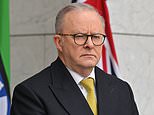Australia finds itself at a critical juncture, navigating increasing domestic and international calls to officially recognize Palestinian statehood. Prime Minister Anthony Albanese faces significant pressure from within his own Labor party, where some senior ministers suggest that such recognition is a matter of “when, not if.” This growing momentum reflects a complex diplomatic challenge, balancing humanitarian concerns with geopolitical realities in the Middle East.
The global landscape increasingly points towards the recognition of Palestine, with over 140 of the 193 United Nations members, including European Union nations like Spain and Ireland, having already taken this step. This widespread international recognition underscores a shift in global sentiment, putting Australia in a position where its traditional allies and counterparts are actively engaging in this significant diplomatic move.
Despite the international push, Australia’s current official position, while supporting a two-state solution for Palestinians and Israelis, remains cautious. Prime Minister Albanese has explicitly stated that any future recognition would not be “imminent” and is contingent on specific, critical conditions. A primary concern is ensuring that Hamas, the de-facto ruling authority in Gaza, plays absolutely no part in the governance of a future Palestinian nation.
Key conditions for Australia’s potential recognition also include agreements on the extensive rebuilding of Gaza and the West Bank, alongside a definitive resolution of issues surrounding the expansion of Israeli settlements. Furthermore, there is an insistence on a non-militarized Palestinian state, a serious security guarantee that the Palestinians have reportedly offered during negotiations, aiming to address critical security concerns.
Prominent voices within the Labor government, such as Federal Labor MP Ed Husic and Treasurer Jim Chalmers, have publicly advocated for the recognition, framing it as an inevitable step for Australia. Chalmers, in particular, echoed the sentiment that it is a matter of “when, not if,” emphasizing the welcome progress and momentum within the international community, yet reiterating the crucial condition of Hamas’s non-involvement.
The escalating humanitarian crisis in Gaza has profoundly fueled the international calls for Palestinian statehood recognition. With over two million people facing dire conditions and starvation, global concern over the soaring civilian death toll and restricted aid access has intensified. While Israel asserts its measures are necessary to prevent aid diversion to Hamas, the international community continues to press for increased humanitarian assistance.
Conversely, the Opposition, through figures like foreign spokeswoman Michaelia Cash, has firmly stated that Australia should not “reward Hamas with a pathway to statehood” while the organization controls Gaza and holds Israeli hostages. The Coalition’s stance highlights a fundamental disagreement, arguing that recognition under current circumstances would be premature and counterproductive to achieving lasting peace and security in the region.
The debate within Australia reflects a broader international dilemma: how to advance a two-state solution amidst ongoing conflict, humanitarian crises, and complex political realities. The push for Palestinian statehood recognition, though conditional, represents a significant diplomatic shift, challenging nations like Australia to navigate a path that balances historical commitments with evolving geopolitical pressures and humanitarian imperatives.






Leave a Reply